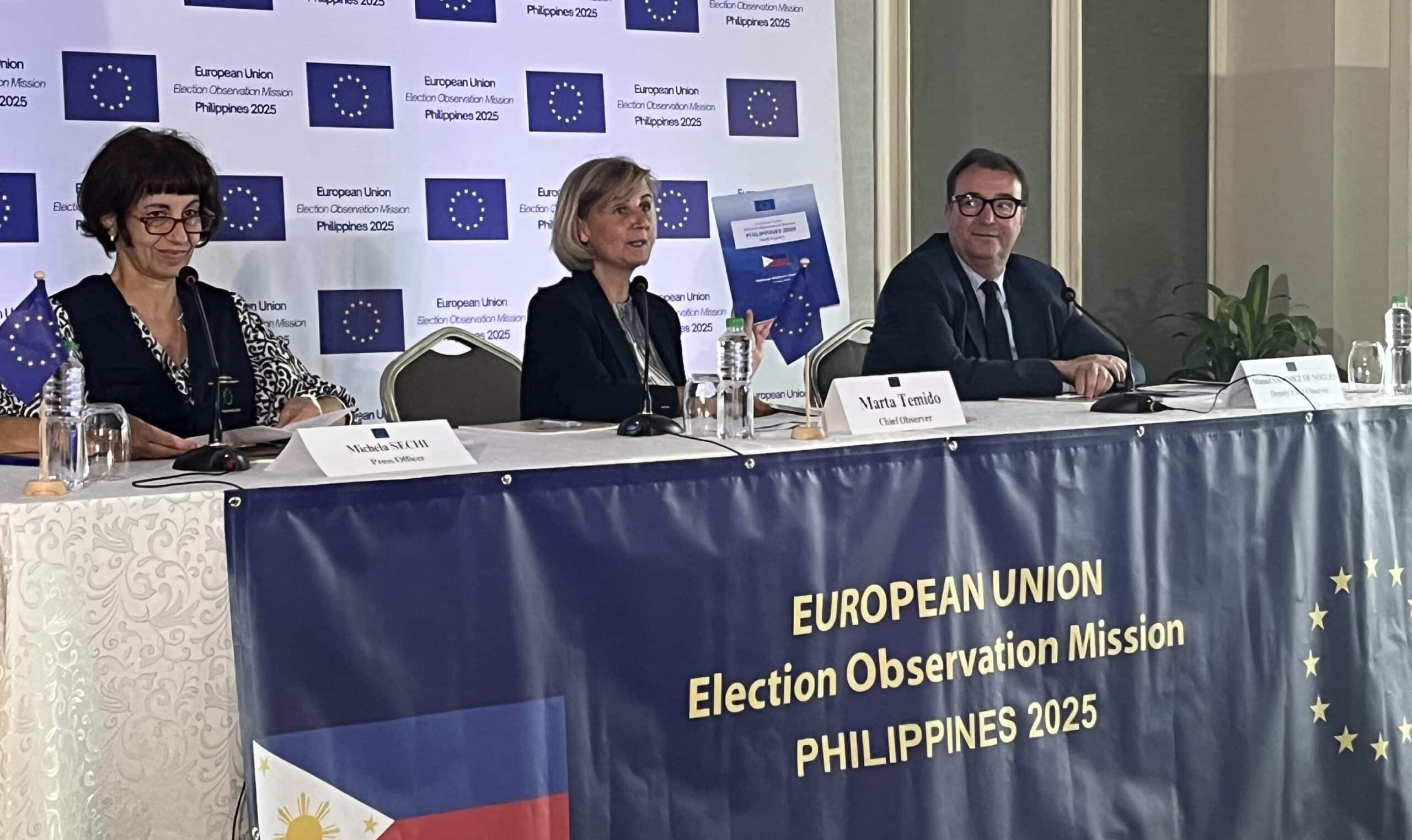Poll bets ‘artificially’ boosted number of their socmed followers

The social media followers of certain candidates during the May elections were found to have been artificially boosted, according to the report of the European Union Election Observation Mission (EU EOM). Chief observer Marta Temido is in the middle, holding up a copy of the final report. Deputy chief observer Manuel Sanchez de Nogues is on the right, while press officer Michela Sechi is on the left.
Updated @ 10:09 p.m., July 3, 2025
MANILA, Philippines – The social media followers of certain candidates during the May elections were found to have been artificially boosted, according to the report of the European Union Election Observation Mission (EU EOM).
READ: Comelec: Election reforms, funding needed to heed EU observers’ advice
“[O]ur findings show that some candidates boosted their campaigns by artificially increasing the number of their followers on social media,” said EU EOM chief observer Marta Temido during a press conference on Thursday.
“This is not illegal, but it can mislead potential voters [and undermine] their ability to make informed choices,” she added.
In its report that was released on Thursday, the EU EOM said “database analysis revealed evidence of artificial growth” in the number of Facebook followers of certain candidates.
The report presented four cases involving Pasay City Mayor Emi Calixto-Rubiano; Taguig City Councilor Jimmy Labampa; former Panabo City, Davao del Norte, Vice Mayor Gregorio “Banjong” Dujali, who ran for the mayoral post; and Kaye dela Cruz, who ran for councilor in Pasig City’s second district during the May polls.
The EOM said the Facebook followers of the candidates increased by more than a million within its 44-day monitoring, although there were no campaign activities that could have led to such a significant increase.
“Any individual with an online presence has a pool of followers… and we know that under certain circumstances, this pool may grow rapidly. A viral effect,” said EOM chief observer Marta Temido in a press conference.
“However, if the number of followers increases by tens, or even hundreds or thousands overnight without any visible cause, it could be considered a suspicious attempt to boost [their campaign],” she added.
In the report, the EU EOM noted that the Facebook followers of former vice mayor increased by 1,132,421; the candidate for councilor by 1,130,962; the Metro Manila City councilor by 1,126,647; and the City mayor by 1,142,507.
The larger follower count increased the average number of impressions, said the EU EOM, with the former vice mayor’s impressions rising to 355 after boosting from 56; the candidate for councilor, 1,145 from 180; the City councilor, 1,217 from 122; and the City mayor, 3,382 from 737.
Out of the four cases, only two were elected.
In the report, the EU EOM noted that Dujali’s Facebook followers increased by 1,132,421; Dela Cruz’s by 1,130,962; Labampa’s by 1,126,647; and Calixto-Rubiano’s by 1,142,507.
The larger follower count increased the average number of impressions, said the EU EOM, with Dujali’s impressions rising to 355 after boosting from 56; Dela Cruz, 1,145 from 180; Labampa, 1,217 from 122; and Calixto-Rubiano, 3,382 from 737.
Out of the four cases, only Calixto-Rubiano and Labampa were elected.
The EU EOM held its observer mission in the Philippines from March 28 to June 2. The group said it was able to observe 2,305 social media accounts, including 1,496 accounts of candidates, 469 accounts of parties, 168 accounts of influencers, 105 accounts of state institutions, 50 for online media outlets, and 17 for civil society organizations./coa /atm


















